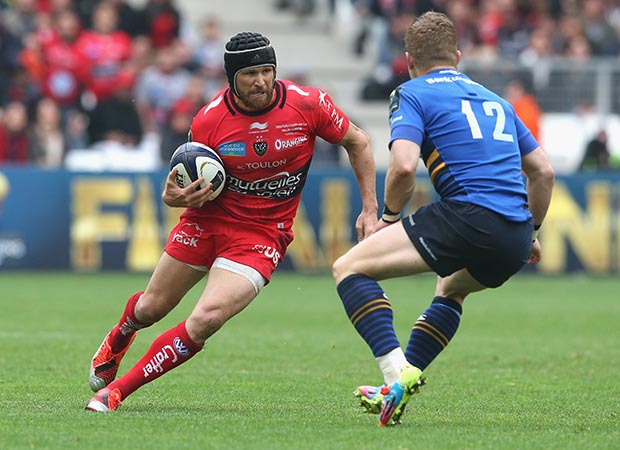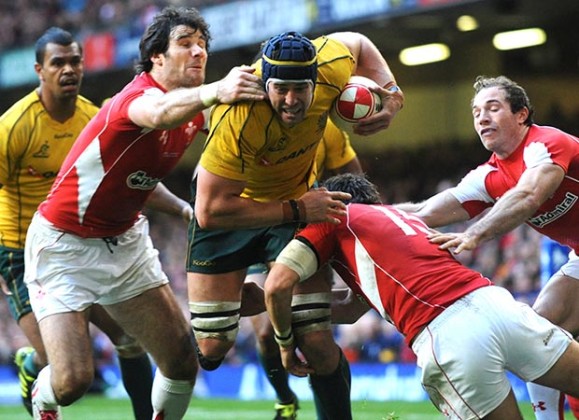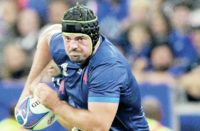 The tectonic plates shifted this week not just in the Pool A fight between England, Wales and Australia for their tripartite struggle for two 2015 World Cup quarter-final places, but in the international game as a whole. The tremor was precipitated by the Australian Rugby Union's decision earlier this week to waive their strict home-based player selection policy in favour of allowing overseas-based Wallabies to play for the green and gold again.
The tectonic plates shifted this week not just in the Pool A fight between England, Wales and Australia for their tripartite struggle for two 2015 World Cup quarter-final places, but in the international game as a whole. The tremor was precipitated by the Australian Rugby Union's decision earlier this week to waive their strict home-based player selection policy in favour of allowing overseas-based Wallabies to play for the green and gold again.
The ripple effects reached as far as Twickenham, where England head coach Stuart Lancaster will have been buffeted by the news that an already formidable opponent would be stronger still. That, in turn, intensified the risk of a massive World Cup shake-up in which the host nation are, for the first time, uncertain of qualifying for the last eight.
With Australia's self-imposed shackles thrown off, the likes of Toulon's Matt Giteau and Drew Mitchell are available for the Wallabies immediately, with both players meeting the initial dispensation criteria of 60 caps and seven years contracted to an Australian Super Rugby franchise.
However, the idea that Giteau, Mitchell and the veteran George Smith – who is still playing with Lyon – are the only beneficiaries of the new edict should be treated with a degree of circumspection.
Michael Cheika, the shrewd Wallaby coach who has driven the agenda of having Australia's best players available for the national team, irrespective of where they are domiciled, has already attracted James O'Connor back to the Reds from Toulon, while Dean Mumm will return from Exeter to the Waratahs.
That makes four very handy additions for Cheika, and it would be no surprise if the seven consecutive seasons with an Australian Super Rugby franchise soon excluded the 60 cap proviso. If that happened the Wallaby coach could add to his plans Northampton tight-head Salesi Ma'afu, Bayonne lock Mark Chisholm, and Montpellier back-rower Ben Mowen, along with Stade Francais wing Digby Ioane.
The inclusion of these eight exiles in Cheika's long-squad for the 2015 World Cup would ensure such ferocity in the selection battle for the final 31-man Wallaby commando that by September it should be fully primed for the assault on England's shores.
One of Australia's biggest issues at Test level in the professional era (and before it) has been a lack of strength-in-depth. Where the Wallaby first string-side has often been formidable, the quality coming off the bench has been less certain – and it has frequently proved to be costly.
The loosening of the selection strictures instigated by Cheika and the ARU chief executive, Bill Pulver, goes a long way to addressing that weakness. The European-based players are, to a man, better for the experience of having played in demanding league and European Cup environments which are more varied and attritional than their Super 15 equivalent.

Giteau in particular has been reinvigorated by his stint with Toulon, benefiting from the unique environment on France's Mediterranean coast in a similar way to Jonny Wilkinson. He showcased his sumptuous array of play-making and finishing skills for Toulon during last season's remarkable European Cup and French Championship double, and although he has struggled with a groin injury this season, there is no doubt that Australia have just re-acquired one of the most dangerous attacking players on the planet.
Giteau will bring a combination of flair tempered, at 32, by a rigour and precision that neither the mercurial Kurtley Beale nor the steady Christian Leali'ifano can offer at inside-centre. This should enable him to provide a hub around which the line-breaking talents of Bernard Foley inside him, and outside him Tevita Kurandrani, Henry Speight, Adam Ashley-Cooper, O'Connor and Israel Folau, can spin.
The Australians have never lacked gifted backs, but the restoration of Giteau gives Cheika a priceless option of turning them into the most lethal strike force in the tournament.
However, the Wallaby coach's most pressing challenge is to fix a set-piece that frequently provides opponents like England with a winning stranglehold.
This was the case at Twickenham five months ago as the England scrum provided the platform for victory with a dominant display over a creaking Wallaby forward unit. Cheika's first move has been to bring in the scrummaging expertise of the former Argentine hooker, Mario Ledesma, to remedy the problem.
Top of the agenda for Cheika and Ledesma will be to identify props, and particularly tight-heads, who can stand and deliver when the heat comes on in the World Cup. Although Ma'afu and the Saints pack did not have the best of days at the scrum in their European Cup quarter-final dusting by Clermont, the former Brumbies No.3 has shown with his consistency and aggression over the past two seasons at Franklin's Gardens that he is the best scrum anchor available to the Aussies.
Ma'afu also brings the added bonus of inside knowledge on all of the England front-row forwards who would be pitted against him, and if he and the improving Sekope Kepu can keep the right-hand side of the Australian scrum solid between them then a traditional pressure point for their Red Rose rivals could be nullified.
Chisholm, who with 58 caps is just two off the magic dispensation number, is another former Brumbies front five forward who has added ballast to his game during his time in the Top 14, and would bolster the Australian set-piece.
Although both forwards are currently outside the new eligibility framework, that could be temporary given a statement by Pulver that the Australian union does not rule out further changes.

The ARU chief executive said: “Given the complexity of the policy around eligibility for selection, I don't really want to suggest that this is the end of the thought process. We take the issue very seriously of talent in Australia moving offshore, and will continue to look at opportunities to refine our policies to deliver the outcomes we want.”
Cheika has also made it clear that he has no truck with the idea that the players who have stayed in Australia have a God-given right to be selected ahead of those who ventured overseas. In the process, he drew a bead on his own disappointment at being continually edged out of the Wallaby contention during the 1990s by outstanding No.8 Tim Gavin.
“I don't think that anyone in Australia is going to complain about having a better national team”, Cheika said. “When I was playing I always wanted to play for Australia but I had to play behind Tim Gavin. He was being selected and I went, ‘well, he's better than me, and Australia's going to be a better team for that'. You can't complain about that. That's the nature of footy – sometimes you're in, sometimes you're out, sometimes opportunity goes your way, and sometimes it doesn't.”
This outlook contrasts starkly with the protectionist policy adopted so far by Lancaster, revealing that when it comes to getting his best team out on the pitch Cheika is a ruthless pragmatist. Whether the England coach responds by including French-based players like Steffon Armitage and Nick Abendanon in his World Cup training squad, despite pressure from squad regulars and from Premiership Rugby to exclude them, remains as clear as mud.
What has become transparent is that New Zealand are now the only major Southern Hemisphere union adhering to the principle that to play international rugby for a country you must be domiciled there, i.e. to play Test rugby for the All Blacks you must be living and playing in NZ.
South Africa were the first Union to lift the ban on overseas players (in 2008), and with Australia now following suit, there will be growing concerns in New Zealand that the Super 15 could become devalued if too many Springbok and Wallaby stars leave the flagship tournament to play in Europe or Japan.
Another potential flashpoint with the new order is how Regulation 9 is enforced. With senior Wallabies like Will Genia (Stade Francais), James Horwill (Harlequins), Quade Cooper (Toulon), Kepu (Bordeaux-Begles) and Wycliff Palu (Japan) all heading overseas after the World Cup, Pulver has said already that Australia intend to make sure that the IRB's regulation regarding international player release is strictly adhered to by European clubs.
It's sure to be pointed out to Pulver that with continual encroachment of international matches into the club season, there may have to be some give as well as take.
On the field, however, with their new dispensation bringing stars like Giteau back into play, the Aussies look eminently capable of dishing it out.


























